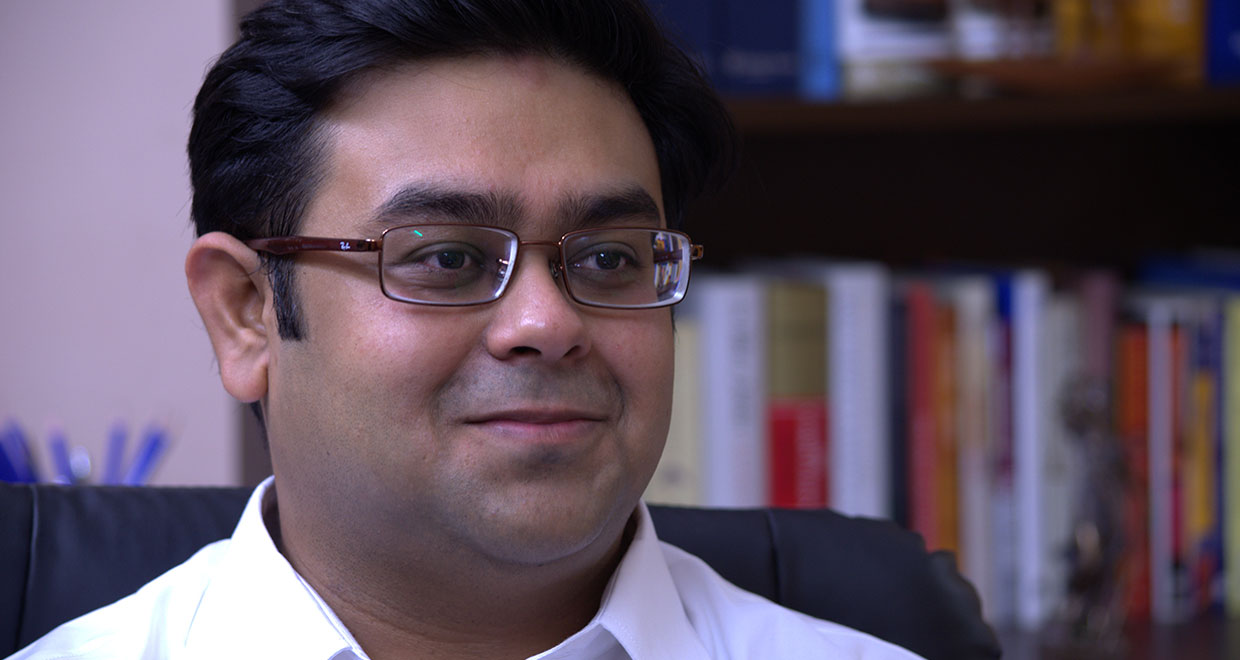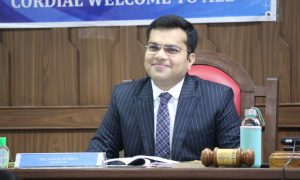Animesh Sinha graduated from Amity Law School, Delhi, in 2008. He started practicing right after graduating from law school. Currently he has his own team at Animesh Sinha and Partners for the last two and a half years. In this interview, we asked him about:
- His mooting experiences in his law school days
- His experiences as a founder of a law firm
- Internship experiences and their value in a law student’s career.
Tell us a little bit about your childhood and your background.
I have been practising law since 2008 after graduating from Amity Law School, Delhi. I started my career with Karanjawala & Co.. After that I went independent and founded Accendo Law Partners. In 2011 I joined Advani & Co as an equity partner. Presently I have my own team at Animesh Sinha & Partners for the last two and a half years.
My father is in a transferable job and I finished my schooling over many schools. I was a good student throughout. Thanks to the efforts of my family consistent good grades allowed me to jump a batch ahead of my batchmates. I was heavily inclined towards extracurricular activities and actively participated in several international and national level debate competitions, science fests and sports events. I was also the president of many clubs and my house contingent in school. I am also very proudly a Rashtrapati Scout. I come from a normal middle-class family and my childhood included the ordinary activities of cricket, vacations, parental push for excellence and other such activities.
What prompted you to take up law as a career?
I am a first-generation lawyer. It is difficult to identify what prompted me to choose law as a career. I was headed towards engineering but was not too excited about it. I believe my father gauged that and considering my background in debating he decided that I write for some law schools. By the time this decision was taken it was too late and I could only apply for GGSIPU (to which Amity Law School is affiliated) and NLS, Bangalore. Even then my primary attention and preparation was for the engineering entrance exams. When the results were out my father suggested I take up law instead. I guess it was my destiny.
As a student were you only focused on academics?
I was good at academics. But academics did not constitute more than a quarter of my time at law school. While I continued to get good scores I grew disillusioned with the system of evaluation at the University. I would like to thank my classmates Ankit Khushu and Bikram Chaudhury for ensuring that I did not let my grades slip.
I spent a lot of time at law school mooting and debating. But what I enjoyed the most was the opportunity to read law without any deadlines and purpose. I spent a lot of time in law school reading law without any immediate objective. This allowed me to read more and develop a good grasp of first principles. I did not realise the benefit then but I deeply cherish it today.
What extra-curricular activities did you take part in that helped you shape up your career?
My grounding in extracurricular activities from school automatically prompted me to continue with extracurricular activities in law school as well. I was an active debater and participated in debates through most of law school. A major chunk of my time at law school was consumed with moot court related activities. I participated in several moot court competitions including Philip C. Jessup, Manfred Lachs, Commonwealth and Heanry Dunant. The experiences and the recognition that moots brought played an important role in developing the lawyer that I am today. These experiences are not limited to legal skills alone but it taught me life lessons on teamwork and human behaviour. Even today I stay in touch with moot courts judging competitions across the country, drafting moot court problems and generally interacting with moot court teams.
I do not believe excellent CGPA is the key to ALL success but I believe it is important to respect any evaluation system as it ensures you do not slacken.
What is your mantra for success in academics?
(Animesh has received the best student award at Amity Law School, Delhi for two consecutive years.)
I do not think it is possible to cast any mantra in a mould. It may sound cliched but then the key components for success in academics according to me are passion for the subject, hard work, diligence and particularly in these times of digital distractions good time management skills.
What were your areas of interest during your graduation?
In law school I just fell in love with some subjects. Contract law was the first legal paper I studied. I was so excited that I coaxed my father to purchase the practitioner’s commentary by Mulla. Till today it is one of the most prized possessions in my library. Almost all the moot courts that I participated in were on public international law. Naturally it became my favourite subject. I even chose international law on outer space as the topic for my dissertation. I still crave to study public international law. However it has become difficult with court practise. Now I look forward to invitations to judge moot court competitions on public international law. It is a great stress buster.
To develop expertise and knowledge in any area one must read voraciously and take some time out to analyse the law and visualise how it applies to practical situations. It is important to provide a context to what you read.
How did you manage to excel in both studies and mooting which seem to eat into each other’s time?
(Animesh has received several prizes and accolades in international moot court competitions including Manfred Lachs, Commonwealth and Philip C. Jessup.)
I do not think they eat into each other’s time. If you plan well there is enough time for both and other activities. I think what helped me most was prior preparation. The memorial submissions for the Commonwealth Moot Court Competition coincided with examinations. We could foresee this and we studied for the examinations in advance. I would also have to credit my friends in law school for helping us out in such times of conflict. But what is most important is that there must be a push to excel. I believe if you have the will to do it you will make things work.
What do you look for in a good mooter?
(Animesh recently drafted as well as judged a recently held National Moot Court Competition.)
Lots of things. It will be difficult to exhaustively enlist all of them here. What I like most are well prepared mooters. I believe the difference between a good mooter and a mooter who wins is prior preparation. A winning mooter will always imagine and rehearse for different situations from beforehand. This prior preparation alone can help a mooter present accurate answers, maintain calm, be aware of material at hand and be better equipped to deal with different kind of judges; amongst dealing with other trials and tribulations faced by mooters.
I have recently written a chapter for a book on moot court which is due to be published by end of this year. It may be helpful if mooters are looking for an exhaustive answer to this question.
How did you muster the courage of starting independent practice at 24?
I confronted myself and reconciled with the fact that it is good to have jitters. I do not think they completely go away. And I believe the jitters keep lawyers on their toes. So it is a good thing and does not require to be fought.
I must concede that my background in mooting and debating helped me a great deal. Mooting taught me the importance of prior and in-depth preparation. It is also important for me to acknowledge what I learnt at Karanjawala & Co. While at Karanjawala & Co I got invaluable experience of observing some of the finest senior advocates at the bar. There was just so much to learn.
Tell us about your experiences of starting your own firm.
My first endeavour to start a law firm was at Accendo Law Partners. We eventually merged Accendo Law Partners with Advani & Co. I started Animesh Sinha and Partners in 2012.
It is an exhilarating experience setting up your own firm. It brings with it several challenges. Infrastructure of the office needs to be developed; you need to be able to hire, retain and pay for lawyers and staff; manage the administration; build and maintain clientele; and above all deliver good quality work. For those wanting to set up their own firm I would like to share some key points. First of all, be sure why you have decided to set up your own firm. The commitment of having your own firm has to survive through tough times and temptations. Secondly, be patient for things to develop. Infrastructure, resources, lawyers, clientele and ability to run your own firm comes over time and with experience. Thirdly, be sure of what kind of services your firm would deliver. This is particularly difficult for young lawyers who are still finding their grounding. For law firms with young teams the burden to work hard is very high and it is very important to have preset goals and a vision for the firm. I would like to encourage students to think ambitiously and develop and sustain the energy and ability to realise their ambitions.
What does a day at work look like for you?
ASP (Animesh Sinha & Partners) is a multidisciplinary law firm. We have considerable experience in dispute resolution, contract preparation and corporate advisory. We particularly specialise in insurance and construction. Our network of clients includes several public sector undertakings, corporate houses, small and medium enterprises and individual litigants. We are a young team of lawyers who are enjoying the process of finding a place in the profession.
A day at work entails attending court and arbitration proceedings and working on different assignments once in office. Running an office demands time for business development and administrative work – sometimes it is drudgery, sometimes exciting. We are very passionate about law and often engage ourselves in academic activities at conferences, law school events and executive training programs.
I would say being a founding partner of a law firm is quite interesting. It can be challenging and stressful at times and different factors may contribute towards it. To identify some- its challenging to sustain work quality; take care of the aspirations of your team; and maintain probity and clear communication with clients. It provides immense opportunity for learning varied things. There is so much more to law than the law itself.
I would like to believe I am maintaining a good work-life balance. Having said that I often have family and friends complain that I am stuck at work. Law as a profession consumes a lot of time. It is important to enjoy it. It is also crucially important to periodically reward oneself with family time, hobbies and fun. I always advise lawyers younger than me to maintain timesheets. It is a good tool to assess work input and it also helps maintain a good work-life balance.
How is the work culture at ASP?
It is natural to commit mistakes. We all do. Fresh graduates often find themselves at the wrong end of the stick for mistakes which seem downright silly and obvious. A lot of this happens because of poor instructions from seniors or because it is the first time a fresh graduate works on a particular kind of assignment. We believe in careful review and revision before we send out any work to the client. It becomes particularly challenging when the time deadlines are stiff. It is important to be patient and mutually complement each other’s strengths and weaknesses. It certainly does not help to browbeat or yell at anyone.
How is internship helpful for a law student?
Internships do help tremendously. My belief is more in favour of interns seeking long-term assignments with fewer offices rather than seeking many short-term assignments with different law offices. This is because long-term assignments allow an intern to learn more, leave a deeper impact and increase one’s chances of being absorbed.
Internships provide invaluable experience regarding several aspects of working in an office including working on real legal assignments, office mannerisms, time discipline et cetera. With every year of added legal knowledge internships provide a scale to judge oneself on one’s ability to analyse and apply the learnt legal knowledge on real-life assignments.
Does ASP take interns?
At the moment we are not taking interns. However we strongly believe in internship programs. I have personally been in charge of internship programs at all the offices I have worked previously. We hope to continue our engagement with interns by resuming the internship program shortly.
What would be your message to law students who dream of having their own law firm one day?
It is very important to continue to dream. Meet your dreams with hard work and dedication. This may sound clichéd but then there are no shortcuts. What is important is to deliver credible and qualitative legal services and not just start an office. Today not every graduate is getting absorbed at law offices of their choice. Consequently, a lot of them claim to be independent. I believe to be able to have a firm of your own it is important to first learn how to work on assignments and deliver credible and qualitative output. Building an office of your own is not about independence of time and independence from command – on the contrary you may find yourself crunched for time trying to bring in work as well as delivering it. It is therefore very important to have a good grounding in the profession first. My message would be to work hard, follow your dreams and continue to work hard and learn for the sake of your dreams.
























